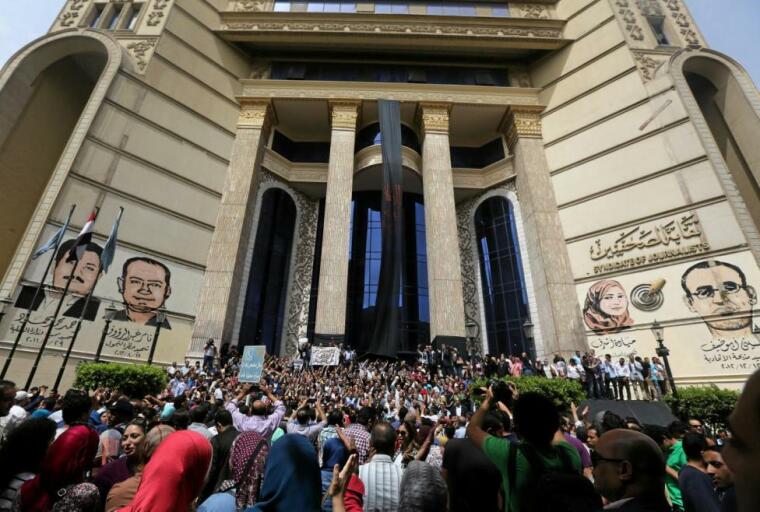Egypt's 'state policy of enforced disappearance' blasted by Amnesty International
Rights group Amnesty International revealed in a scathing report Egypt's "state policy" of enforced disappearance among political dissidents and activists as hundreds are whisked away to be tortured.
The global movement that boasts more than seven million human rights campaigners released Wednesday, July 13 its incendiary report, titled "Egypt: 'Officially, You Do Not Exist' – Disappeared and Tortured in the Name of Counter-Terrorism: Executive Summary," where it revealed intense political crackdown under the government of President Abdel Fattah el-Sisi.

The report highlighted the "government's own admission and possible thousands more" of at least 34,000 detained since el-Sisi unseated former President Mohamed Morsi in July 2013. The list includes hundreds of the deposed president's supporters, prominent members of the Muslim Brotherhood (MB) and political dissidents.
"Enforced disappearance has become a key instrument of state policy in Egypt. Anyone who dares to speak out is at risk," Philip Luther, director of the Middle East and North Africa Programme at Amnesty International, said in a statement.
Amnesty based its report on 70 interviews conducted with victims, families and lawyers. It exposed the state's strategy of authorities invading victims' houses without producing any arrest warrants and then taking the victims to undisclosed locations where they're extorted to confess to their alleged crimes. The courts then issue sentences from trials based mainly on extorted confessions.
Victims also provided testimonies of how they suffered abuse "in the form of rape, assault and verbal threats," and experienced being suspended "by the limbs while handcuffed and nude." Some detainees are also said to have suffered electric shocks as well as the "grill" torture infamous in former President Hosni Mubarak's time.
Shortly after its release, the Egyptian Ministry of Foreign Affairs (MFA) took to Facebook to respond to the report and accused Amnesty for being "not impartial" and politically-motivated.
"[The Foreign Ministry spokesperson] stated that any objective reader will recognize from the outset that Amnesty International's reports on Egypt rely solely on sources that express one side of the story, and persons and entities that are hostile towards the Egyptian state," MFA's statement read. It also accused the rights group of "neglecting the actions taken by the judiciary regarding the addressed cases in accordance with the explicit principles and provisions of the Egyptian constitution and law."
 Christians don't have to affirm transgenderism, but they can’t express that view at work: tribunal
Christians don't have to affirm transgenderism, but they can’t express that view at work: tribunal Archaeology discovery: Medieval Christian prayer beads found on Holy Island
Archaeology discovery: Medieval Christian prayer beads found on Holy Island Presbyterian Church in America votes to leave National Association of Evangelicals
Presbyterian Church in America votes to leave National Association of Evangelicals Over 50 killed in 'vile and satanic' attack at Nigerian church on Pentecost Sunday
Over 50 killed in 'vile and satanic' attack at Nigerian church on Pentecost Sunday Ukrainian Orthodox Church severs ties with Moscow over Patriarch Kirill's support for Putin's war
Ukrainian Orthodox Church severs ties with Moscow over Patriarch Kirill's support for Putin's war Islamic State kills 20 Nigerian Christians as revenge for US airstrike
Islamic State kills 20 Nigerian Christians as revenge for US airstrike Man who served 33 years in prison for murder leads inmates to Christ
Man who served 33 years in prison for murder leads inmates to Christ


 Nigerian student beaten to death, body burned over ‘blasphemous’ WhatsApp message
Nigerian student beaten to death, body burned over ‘blasphemous’ WhatsApp message 'A new low': World reacts after Hong Kong arrests 90-year-old Cardinal Joseph Zen
'A new low': World reacts after Hong Kong arrests 90-year-old Cardinal Joseph Zen Iran sentences Christian man to 10 years in prison for hosting house church worship gathering
Iran sentences Christian man to 10 years in prison for hosting house church worship gathering French Guyana: Pastor shot dead, church set on fire after meeting delegation of Evangelicals
French Guyana: Pastor shot dead, church set on fire after meeting delegation of Evangelicals ‘Talking Jesus’ report finds only 6% of UK adults identify as practicing Christians
‘Talking Jesus’ report finds only 6% of UK adults identify as practicing Christians Mission Eurasia ministry center blown up in Ukraine, hundreds of Bibles destroyed: 'God will provide'
Mission Eurasia ministry center blown up in Ukraine, hundreds of Bibles destroyed: 'God will provide' Church holds service for first time after ISIS desecrated it 8 years ago
Church holds service for first time after ISIS desecrated it 8 years ago Burger King apologizes for 'offensive campaign' using Jesus' words at the Last Supper
Burger King apologizes for 'offensive campaign' using Jesus' words at the Last Supper Uganda: Muslims abduct teacher, burn him inside mosque for praying in Christ’s name
Uganda: Muslims abduct teacher, burn him inside mosque for praying in Christ’s name